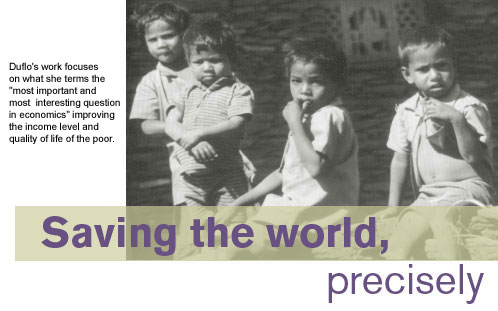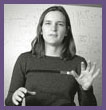
How do you pick the questions you pursue? I'm interested in making the life of poor people better. The questions I pick always have some relationship with that. Obviously, that leaves many questions available. There is education, health, local government, the role of women—and within each of these domains, I try to focus on the questions to which I can give an empirical answer. If I find a topic on which I can say something precise, which has scientific and practical implications, and which can inform policy making, that is a question I'm going to pick. So key to your selection is the ability to control for variables and integrate the data into economic formulae? Most of the questions I'm trying to answer focus on the impact of a particular policy on the variable it was trying to affect. For example, if you have an education program, what is the impact? The intervention could be providing textbooks, computers, a second teacher. Suppose I had not given the textbooks to these schools. Would they have done better, worse, or the same? You're never going to observe the same kids with and without the textbooks. So you have to find a group of schools for comparison purposes. And the problem is that this group of schools doesn't really exist. For example, if communities buy the textbooks, you're going to have textbooks in rich communities. If the government provides the textbooks, you may have textbooks everywhere. So when you're comparing children's learning in schools with and without textbooks, you have all these confounding factors. What the policy maker needs to know is: What difference does it make if I put in books? Not, "what's the difference between schools with and without textbooks." My research tries to provide the conditions under which you can make these comparisons. What makes you so dedicated to the poor? To me, that's unambiguously the most important and interesting question in economics. You can think about how to help very rich people make a little bit more money, or gain 1 percent of GDP by improving the efficiency of tax collection in the US. Or you can think about how to improve income and quality of life in Mali, where people are making $240 per capita a year. The orders of magnitude are just very different, and the potential for improvement is enormous. Your emphasis is clearly on changing, not just on studying. Yes, definitely. It's a matter of temperament. Do you just want to study, to be a positive economist, to sit and watch? Or do you want to be normative, to make suggestions about how things could be improved? I'm definitely on the normative side. Where does this interest come from? I've always been interested in development. In fact, this is why I started doing economics in the first place. I was studying history as an undergraduate [in France]. By chance, I started doing economics as a supplement to history. But at that point, I didn't see economics as having any use in the world. When I spent one year doing historical research in Russia, I started working for an economist on the side, and I realized it actually could be useful. Economics gave me a lead to actually be involved in policy and focus full-time on what I was really interested in. The key moment came when I realized I could do it for a living. Before that, I was an historian and working with NGOs as a hobby. I was very committed to development, but I never wanted to be a full-time NGO person. To be an academic, you need to be a little skeptical, and to be an NGO person, you need to be the opposite of skeptical. Let's move on to the revolution that is changing the way policies are evaluated. [laughs] We're hoping we will eventually change the way policies are evaluated, but we are not there, by any stretch of the imagination. Basically, the issue is, 'What's the impact of policy?' The way policies are evaluated right now does not answer this impact question at all. Evaluations try to answer a question that's useful, but different: "Was the policy actually implemented, and how well?" Suppose you wanted to provide textbooks in schools. Did the books actually reach the schools? Do people actually use them? You might do some school visits and see whether the textbooks are used, and whether the children seem happy, or whether the textbooks are kept in some locked cabinet so that they don't get wet. It's called process evaluation. You're saying this is important. It's key, because you have to know how your money was spent. But the question that is sometimes left unanswered is, "Do the textbooks make a difference in children's learning?" That's where there is a lot of waste. What we want to do here is compare what actually happens with the textbooks to what would have happened without textbooks. What school of economists has the most trouble with the economics you practice? There are lots of people who ask me why I call program evaluation "economics." Why isn't it sociology or public policy? Economics is about the best way to allocate resources, and finding out what works is important to understanding how to allocate these resources. In addition, the tools of economics are very important. The art of asking extremely dumb, simple questions, like "What is the impact of this on learning?" and the statistical baggage that goes behind it—this is the outlook of an economist. As long as nobody else does it, I should do it, because irrespective of whether it's economics or not, it's interesting and important. But I don't do only program evaluation; I also develop and test economic models. Tell me about your research involving women village leaders in India. What did you discover? In India, the government picked one-third of villages randomly, and they told them, "You can only elect a woman as your representative of the village." This was to ensure women's representation in politics. The representatives administer money for local public goods and infrastructure, like wells, drinking water, and schools. So we did a village survey, and found in those villages where women are elected that different types of public goods are provided. In particular, they invest much more in drinking water, perhaps because they are the ones who fetch water. So how does this contradict mainstream economic theory? It does not contradict economic theory, but it contradicts the basic political model which concludes that a policy maker's identity—gender, caste, and race, for example—is irrelevant to the decisions made, because the policy maker represents voters, and therefore the electorate's composition determines policy decisions, not the policy maker's identity. A politician is going to choose programs to maximize his chance of being elected. And the programs that maximize his chance of being elected have only to do with the voters and nothing to do with him or her. This basic, very powerful model predicts that no individual characteristics of the policy maker should predict outcome. But I found that the specific person in charge matters. This has important implications for how we design policies and political institutions. Let's segue to MIT. What do you like about being here? The Economics Department here is great. It's a very collegial department, where everybody talks to everybody. Also, I love the students. The undergraduates are both very smart and very committed. The ones in my development class come with a view that they want to change something. They want to understand why countries are poor, and what can be done about it. The combination of the two makes it just a great mix. |
|
|||||||||||||||
 Esther Duflo, the Castle Krob Career Development Professor of Economics, is a leading member of a group of scholars who are committed to applying rigorous evaluation standards to development issues. Along with MIT economists Abhijit Banerjee and Sendhil Mullainathan, she co-founded the MIT Poverty Action Lab, aimed at scientifically evaluating key policy questions. She is a recipient of the Elaine Bennett Prize for Research (2003), and was nominated the same year for the Best Young French Economist Prize. Duflo, co-editor of the Journal of Development Economics and associate editor of the Journal of Economic Perspectives, received her undergraduate degree in history and economics from the Ecole Normale Supúrieure (Paris) in 1994, a masters in economics from DELTA (Paris) in 1995, and her PhD in economics from MIT in 1999. In this conversation with soundings contributing editor Orna Feldman, she discusses her approach to development.
Esther Duflo, the Castle Krob Career Development Professor of Economics, is a leading member of a group of scholars who are committed to applying rigorous evaluation standards to development issues. Along with MIT economists Abhijit Banerjee and Sendhil Mullainathan, she co-founded the MIT Poverty Action Lab, aimed at scientifically evaluating key policy questions. She is a recipient of the Elaine Bennett Prize for Research (2003), and was nominated the same year for the Best Young French Economist Prize. Duflo, co-editor of the Journal of Development Economics and associate editor of the Journal of Economic Perspectives, received her undergraduate degree in history and economics from the Ecole Normale Supúrieure (Paris) in 1994, a masters in economics from DELTA (Paris) in 1995, and her PhD in economics from MIT in 1999. In this conversation with soundings contributing editor Orna Feldman, she discusses her approach to development.